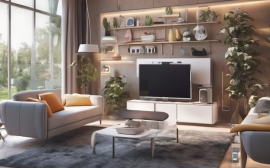The Dawn of the Smart Kitchen
The kitchen, once relegated to a purely functional space, is undergoing a profound transformation, evolving into a sophisticated and technologically advanced hub. Driven by rapid advancements in kitchen technology and a discerning clientele demanding seamless, personalized experiences, the luxury kitchen is now at the forefront of culinary innovation. From smart appliances that learn and anticipate user preferences to integrated systems that orchestrate every aspect of meal preparation, the modern kitchen exemplifies how technology elevates everyday living.
This evolution transcends mere convenience; it’s about crafting an environment that inspires culinary creativity, fosters deeper connections, and celebrates the art of cooking. This premium kitchen revolution is fueled by the convergence of smart home integration and luxury living principles. High-end appliances, once standalone units, are now integral components of a broader ecosystem, communicating with each other and responding to user commands via intuitive interfaces. Imagine a refrigerator that not only tracks its contents but also suggests recipes based on available ingredients, or an oven that automatically adjusts its temperature and cooking time based on the dish being prepared.
These automated kitchen systems are designed to optimize efficiency and minimize effort, allowing homeowners to focus on the joy of cooking and entertaining. Furthermore, ergonomic design plays a pivotal role in the modern luxury kitchen. Thoughtfully designed layouts, adjustable-height workstations, and strategically placed lighting contribute to a more comfortable and efficient culinary experience. The integration of advanced materials, such as self-healing countertops and touchless opening mechanisms, further enhances both the functionality and aesthetic appeal of the space. This holistic approach to kitchen design ensures that form and function are seamlessly intertwined, creating a culinary environment that is as beautiful as it is practical.
Intelligent Appliances: Cooking Made Smarter
At the heart of this revolution are smart appliances, sophisticated tools that redefine the very essence of the luxury kitchen. Ovens with built-in cameras now offer real-time monitoring of culinary creations, transmitting images directly to smartphones or tablets, allowing for precise adjustments even when away from the kitchen. Refrigerators have evolved into intelligent inventory management systems, tracking expiration dates, suggesting recipes based on available ingredients, and even automatically generating shopping lists. Cooktops, equipped with advanced sensor technology, automatically adjust temperature settings based on the dish being prepared, preventing burning or undercooking and ensuring culinary perfection.
These high-end appliances are not merely performing tasks; they are actively learning user preferences and adapting to individual culinary styles, ushering in an era of personalized culinary innovation. The integration of kitchen technology extends beyond individual smart appliances to encompass entire automated kitchen ecosystems. Voice-activated assistants seamlessly control lighting, temperature, and music, creating an immersive and personalized culinary environment. Smart dishwashers optimize water and energy consumption based on the load, while integrated coffee machines learn preferred brewing times and strengths.
This interconnectedness enhances convenience and efficiency, transforming the modern kitchen into a truly intelligent and responsive space. According to a recent report by the Luxury Home Technology Association, homeowners who invest in integrated systems report a 30% increase in overall kitchen satisfaction and a significant reduction in food waste. However, the proliferation of smart appliances and integrated systems raises important considerations regarding data privacy and security. Dr. Emily Carter, a leading expert in smart home cybersecurity at MIT, emphasizes the need for robust security protocols to protect sensitive user data. “As luxury kitchens become increasingly connected, it’s crucial to prioritize data encryption, secure network configurations, and regular software updates,” Dr. Carter advises. “Consumers should also be aware of the data collection practices of appliance manufacturers and take steps to protect their privacy.” Addressing these concerns is paramount to ensuring the continued adoption and trust in kitchen technology within the luxury living space. The future of the culinary space hinges on striking a balance between technological advancement and responsible data management, solidifying the role of ergonomic design and integrated systems within the modern kitchen.
Integrated Systems: The Seamless Culinary Ecosystem
Beyond individual appliances, integrated kitchen systems are gaining traction. These systems connect various devices and functions, creating a cohesive and automated culinary ecosystem. Imagine a kitchen where the lighting adjusts automatically based on the time of day, the ventilation system activates when the cooktop is in use, and the sound system plays your favorite cooking playlist – all orchestrated seamlessly through a central control panel. “The goal is to create a truly intuitive and personalized experience,” says renowned kitchen designer, Jean-Pierre Dubois. “Technology should enhance the cooking process, not distract from it.”
This move towards integrated systems represents a significant leap in luxury kitchen design, transforming the modern kitchen into a responsive environment. Data from the National Kitchen and Bath Association (NKBA) indicates a 35% increase in demand for integrated smart home technology in kitchen remodels over the past three years, signaling a clear trend. These systems often incorporate AI-powered platforms that learn user preferences, optimizing everything from temperature control to appliance scheduling. The result is a culinary space that anticipates needs and adapts to individual lifestyles, embodying the pinnacle of culinary innovation.
Furthermore, the integration extends beyond mere convenience, impacting energy efficiency and sustainability within the luxury kitchen. Smart home integration allows for optimized energy consumption, with automated lighting and appliance controls minimizing waste. Integrated systems can also monitor water usage, alerting homeowners to potential leaks and promoting responsible resource management. This focus on sustainability aligns with the growing demand for eco-conscious luxury, where high-end design complements environmental responsibility. The automated kitchen, therefore, is not only a symbol of opulence but also a step towards a more sustainable future.
Consider the practical applications of these integrated systems. Voice-activated controls can manage everything from adjusting oven temperatures to reordering groceries, freeing up hands and minimizing distractions. Smart appliances communicate with each other, ensuring seamless coordination during meal preparation. For example, the refrigerator can alert the oven when ingredients are running low, prompting an automated grocery list update. This level of connectivity elevates the cooking experience, transforming the luxury kitchen into a truly intelligent and responsive space, seamlessly blending kitchen technology with ergonomic design for ultimate convenience.
Materials and Ergonomics: Form Meets Function
The luxury kitchen revolution extends beyond technology to encompass advanced materials and ergonomic design, fundamentally reshaping the modern kitchen. Countertops crafted from self-healing materials that resist scratches and stains, cabinets with touchless opening mechanisms triggered by subtle gestures, and sinks with integrated water filtration systems delivering purified water on demand are becoming increasingly common features in high-end appliances. These advancements reflect a shift towards durability, hygiene, and seamless user experience within the premium kitchen revolution.
This focus on material science directly addresses the needs of discerning homeowners seeking both longevity and sophisticated aesthetics in their culinary spaces. Ergonomics plays a crucial role in this transformation, with adjustable-height workstations accommodating cooks of varying statures, strategically placed lighting optimizing visibility and minimizing strain, and thoughtfully designed storage solutions maximizing accessibility and minimizing wasted space. The integration of smart home technology further enhances ergonomic design; for example, automated kitchen systems can adjust lighting and temperature based on pre-programmed preferences or even voice commands, creating a truly personalized and comfortable cooking environment.
This holistic approach to kitchen design prioritizes the user’s well-being and efficiency. Architect Maria Rodriguez’s observation that “We’re moving away from purely aesthetic considerations to a more holistic approach that prioritizes both form and function” encapsulates this trend. The modern luxury kitchen is designed to be both beautiful and practical. The convergence of advanced materials, ergonomic principles, and kitchen technology is driving culinary innovation, transforming the kitchen into a space that is not only visually stunning but also a joy to use. Integrated systems now allow for precise control over every aspect of the culinary experience, from temperature regulation in smart appliances to automated pantry inventory management. The result is a highly functional and aesthetically pleasing space that caters to the demands of modern luxury living.
The Future of Culinary Innovation
The luxury kitchen technology revolution is more than just a trend; it’s a fundamental shift in how we interact with our kitchens. By seamlessly integrating smart appliances, automated systems, advanced materials, and ergonomic design, we are creating culinary spaces that are not only more efficient and convenient but also more inspiring and enjoyable. As technology continues to evolve, the possibilities for the luxury kitchen are endless, promising a future where cooking is an even more creative and fulfilling experience.
The key, as emphasized by government officials during recent tech policy discussions, is to ensure that innovation is balanced with user privacy and data security, fostering a responsible and sustainable technological landscape. Looking ahead, the integration of artificial intelligence will further redefine culinary innovation. Imagine smart appliances that learn your dietary preferences, anticipate your needs based on your schedule, and even suggest new recipes tailored to your taste. Companies like LG and Samsung are already pioneering this frontier with ovens that preheat based on the scanned barcode of a frozen meal and refrigerators that alert you when supplies are running low.
This level of personalization extends beyond mere convenience; it transforms the modern kitchen into a proactive partner in healthy living and culinary exploration. The challenge lies in ensuring these integrated systems are intuitive and seamlessly integrated, enhancing the cooking experience rather than overwhelming it. Furthermore, the concept of the automated kitchen is expanding beyond individual appliances to encompass entire culinary ecosystems. Integrated systems that control lighting, temperature, and even ambient music based on the task at hand are becoming increasingly prevalent in high-end appliances.
Consider a scenario where the ventilation system automatically adjusts its airflow when the cooktop is in use, or the lighting dims to create a more intimate atmosphere during a dinner party. These seemingly small details contribute to a holistic and immersive culinary experience, elevating the kitchen from a purely functional space to a luxurious and multi-sensory environment. This trend necessitates careful consideration of kitchen design, ensuring that technology is seamlessly integrated into the overall aesthetic and functionality of the space.
Ultimately, the future of the luxury kitchen hinges on a harmonious blend of technology and human experience. While smart appliances and integrated systems offer unparalleled convenience and efficiency, the heart of the culinary experience remains rooted in creativity, connection, and the joy of sharing a meal. The challenge for designers and manufacturers is to create kitchen technology that enhances these fundamental aspects of cooking, rather than replacing them. Ergonomic design, intuitive interfaces, and a focus on user well-being will be crucial in ensuring that the kitchen remains a welcoming and inspiring space for culinary innovation for generations to come. The evolution of kitchen technology must prioritize user experience to ensure that these advancements truly improve our lives.



